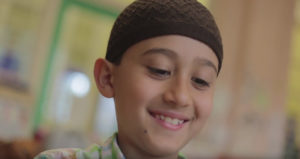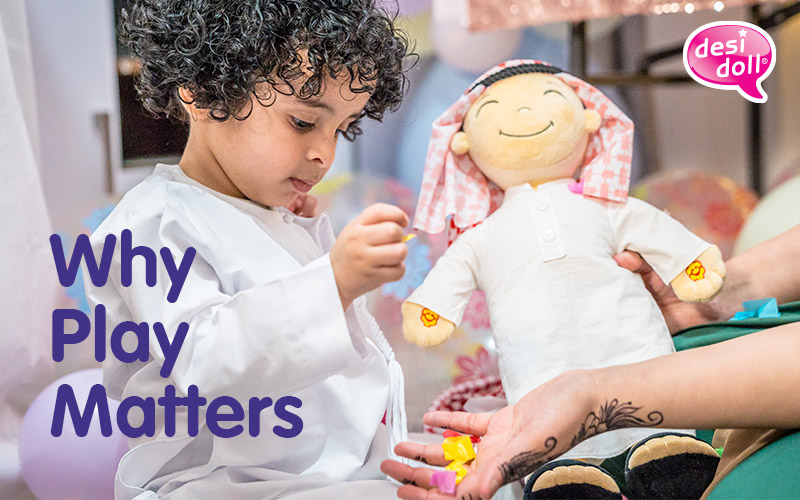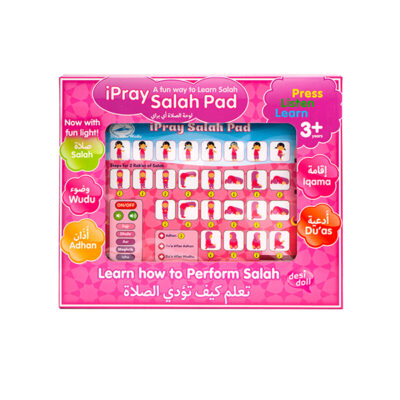The Importance of Play for Children
During early childhood, massive developmental changes occur in a child. This is the time when children’s cognitive and physical develop is rapidly changing as they learn through their senses; by tasting, touching, seeing, hearing and smelling the world around them.
As they get older, they start to observe the environment and the people in their lives, and begin mimicking what they see. Then finally, they begin to play.
As mothers we know that play matters…but why? Why is playing so important for our children?
Play is not an idle folly that has no purpose other than entertainment. In fact, play is the single most important activity that young children can do to learn and lay down the foundations for success in later life.
Islamic Tradition
Traditional Muslim societies of the past gave value to play and understood its importance. Traditionally, formal education was not started until the age of seven lunar years.
Ali ibn Abi Talib (radiallahu anhu) said about educating children,
“Play with them for the first seven years; then teach them for the next seven years; then advise them for the next seven years (after that).”
Scientists today are concerned that the move to teaching young children earlier and reducing their play time is damaging “children’s academic achievements and their emotional well-being”. [1.]
It’s a Human Right!
Play is regarded as so important by experts that the right to play is actually protected by the UN convention on the Rights of the Child (Article 31), which states that every child should have:
“…the right to rest and ensure, to engage in play and recreational activities appropriate to the age of the child and to participate freely in cultural life and the arts.” [2.]
It is evident to anyone who has spent time around children, that they have an innate NEED to play, and to deny them this is to deny them their rights.
 Benefits of Play
Benefits of Play
Just as healthy food nourishes the body of the child, abundant opportunities to play nourish the mind.
Here are a few ways that play benefits children:
-
Builds Confidence
Playing gives children the opportunity to test their limits and take risks, which all contribute to boosting the child’s confidence.
-
Improves Concentration
Anyone who has watched a child play will testify to the incredible focus they show when motivated. Repeatedly focussing will develop their ability to concentrate, which will benefit them when they reach school-age.
-
Manage Emotions
Play helps children to learn how to manage their emotions. Within the safety that play offers, children learn to deal with stress and frustration, and well as develop patience and understanding.
-
Solve problems
Play provides abundant opportunities to develop critical thinking and problem solving skills.
-
Develop Social Skills
Playing with others is fantastic way to develop social skills, and help prepare children for group learning at school or difficult social situations.
-
Self-Expression
The ability to express themselves is so important for future success, and learning this ability begins with play.
-
Foundation for Literacy
Playing allows children to practice new sounds and words that they have heard.
-
Improves Relationships with Carers
Play encourages ADULTS to communicate with their children and learn from their body language.
-
Encourages Creativity
Play encourages children to use their imagination and encourages creativity. Sir Ken Robinson, an international advisor and speaker on education, said, “Creativity is now as important in education as literacy.”
-
Develops motor skills
Playing with toys or with one another gives children ample opportunity to develop motor skills.
-
It’s Fun!
Children innately want to play. They enjoy doing it and so they will continue to play at every opportunity. What a blessing that something so beneficial to them is also so much fun! Alhumdulillah!
Scientists and experts in the field of Education agree that play is necessary for optimum cognitive and physical development. The Canadian council on Learning stated,
“Play nourishes every aspect of children’s development – it forms the foundation of intellectual, social, physical, and emotional skills necessary for success in school and in life. Play paves the way for learning.”
That is why we, at The Desi Doll Company, have designed a variety of toys to encourage creative and imaginative play. Through play, we hope that our toys will benefit the intellectual and physical development of your child; as well as their spiritual development. We strongly believe that learning about Islam should be fun and primarily taught through play in the early years. The Desi Doll Company passionately believes that PLAY MATTERS!
How do you encourage play with your children? Do you think some type of play are more beneficial than others? Do you have an only child? Do you think this makes a difference to how much or the type of play to do?




